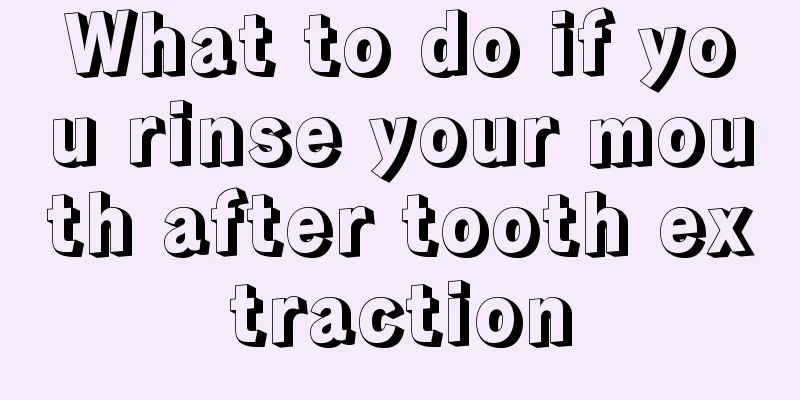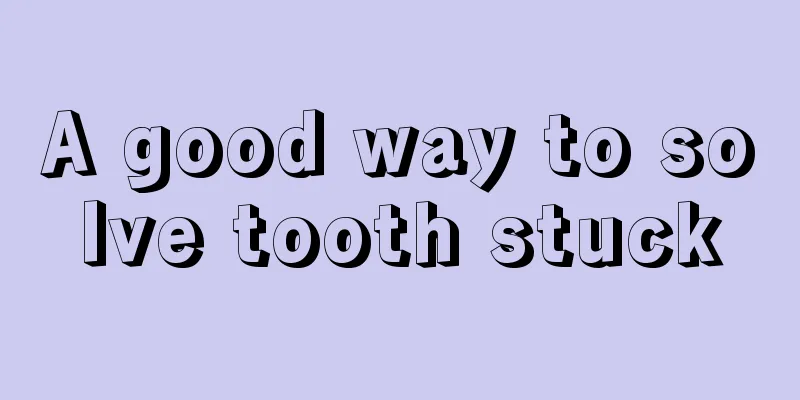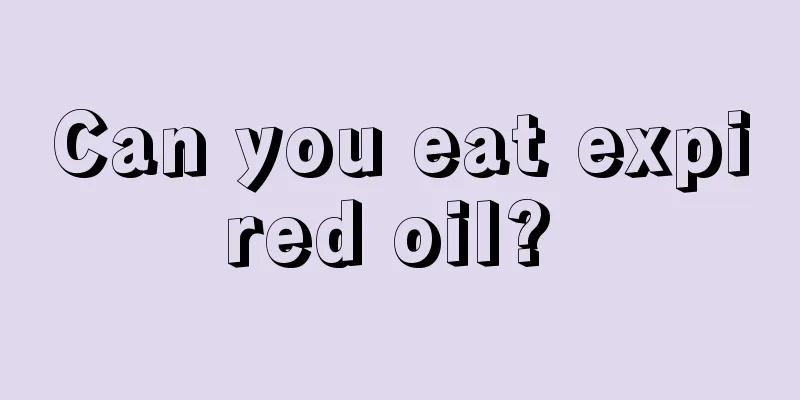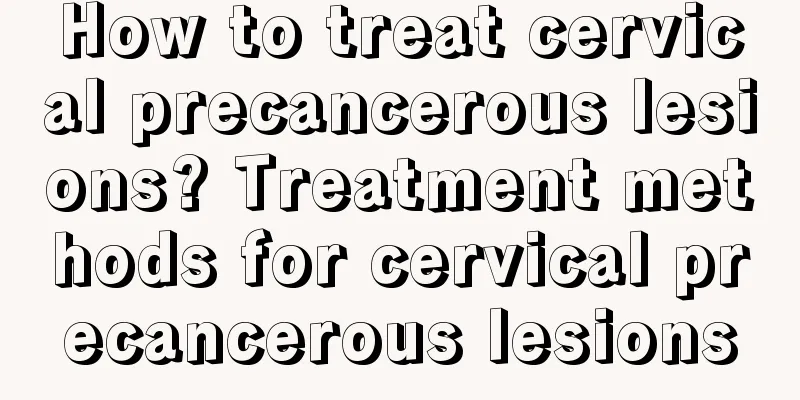What to do if you rinse your mouth after tooth extraction

|
Many people have to have their teeth extracted in their daily lives. For example, if wisdom teeth become inflamed and severely damage normal teeth, they have to be extracted. Tooth extraction is a painful process and requires good care, otherwise it may cause serious harm. Generally, after tooth extraction, the doctor will advise the patient not to rinse the mouth to avoid consequences such as oral infection. But what should you do if you accidentally rinse your mouth after tooth extraction? Why can't you rinse your mouth after a tooth extraction? 1. Not conducive to healing After tooth extraction, local fibroblasts extend and grow from the alveolar bone wall towards the blood clot, and gradually organize the blood clot to make it firm and strong. If you rinse your mouth at this time, the blood clot may be rinsed away, causing bleeding again, causing pain, and prolonging the healing time. 2. Prone to infection If you rinse your mouth after tooth extraction, it will cause the loss of medicine and the growth of bacteria, increasing the chance of tooth wound infection, causing infection, pain, swollen gums and other inflammatory phenomena. In severe cases, it can also lead to fluctuations in blood pressure, body temperature, and pulse, so you must be careful. 3. Prone to secondary damage After tooth extraction, the gums have suffered mechanical damage and are already very fragile. Rinsing your mouth at this time may aggravate the damage. Soaking in water for a long time will also increase the negative pressure in the oral cavity and destroy the coagulation ability, which will cause secondary damage to the teeth. What to do after tooth extraction 1. You can bite a cotton ball after tooth extraction Generally, after extracting a tooth, the doctor will place a small piece of gauze or cotton ball at the extraction site. To prevent heavy bleeding, you should bite the cotton ball and smile for an hour. After spitting it out, do not touch the wound with your hands or lick the wound with your tongue. 2. Pay attention to the wound after tooth extraction Try not to spit or touch the wound with anything within 24 hours after tooth extraction to avoid causing the wound to bleed again. You can drink more fruit juice to supplement vitamin C and B complex to promote wound healing. 3. Pay attention to brushing your teeth after tooth extraction Do not brush your teeth or rinse your mouth within 24 hours after tooth extraction, and try to talk as little as possible. In addition, you must use mouthwash after meals and before going to bed. Hold it gently for thirty seconds and then spit it out slowly to prevent bacterial infection. 4. Pay attention to your diet after tooth extraction Try not to eat spicy, hot, hard, or cold foods within 24 hours after tooth extraction. You can drink porridge and eat noodles. You can drink water and eat semi-liquid food such as porridge, thin noodles, etc. 2 hours after tooth extraction. Do not eat too hot or too hard food, do not drink strong alcohol, do not smoke, and do not eat spicy food. Seven major time points for tooth extraction 30 minutes After tooth extraction, please bite the cotton roll tightly to apply pressure to stop bleeding. If there is no fluid bleeding from the wound after 30 minutes, spit out the cotton roll. For patients with bleeding tendency, it is recommended that they rest for a while in the waiting area after tooth extraction and observe for at least 30 minutes. They can leave only after the doctor's confirmation. It is not recommended to bite the cotton roll for too long, otherwise it may increase the chance of infection and may also cause poor coagulation. 2 hours You can eat 2 hours after tooth extraction, but avoid eating hot, spicy or hard food, otherwise it will irritate the wound. It is recommended to eat warm semi-fluid food and try not to chew with the affected side. For pediatric patients, the corresponding face or lips will become numb and painless until the anesthetic effect has completely worn off. Some children may become curious about this feeling and repeatedly bite or scratch the numb area with their hands, causing damage to the mucous membrane or skin. Parents should pay attention to stop this behavior in time. 24 hours Do not rinse your mouth within 24 hours and do not repeatedly touch the wound with your hands or tongue, otherwise it will easily increase the risk of infection. At the same time, do not brush your teeth, play musical instruments, suck or spit within 24 hours, because these actions will irritate the wound, cause the formed blood clot to fall off, and cause bleeding to occur again. You can brush your teeth and rinse your mouth after 24 hours, but be gentle and try not to touch the wound. After each meal, you can gently rinse your mouth with light salt water to clean up food residues in the alveolar socket in time. 48 hours Within 48 hours, you can use an ice pack or a frozen mineral water bottle wrapped in a towel to apply a cold compress to the surgical area. Each session lasts 15 minutes, followed by a rest period of more than 15 minutes to reduce postoperative swelling, pain, and bleeding. But be careful to prevent frostbite on the skin, especially in the first 2 to 3 hours after tooth extraction when the anesthetic effect has not completely worn off. After 48 hours, hot compress can be applied to enhance local blood circulation and promote healing. You must remember this after tooth extraction, otherwise it will ruin your life 3 days Do not engage in strenuous exercise within 3 days after tooth extraction to avoid further bleeding from the wound. For patients whose tooth extraction process is complicated, traumatic, and who experience obvious pain and swelling after the operation, they can take antibiotics and painkillers as appropriate according to the doctor's advice. In severe cases, intravenous anti-inflammatory treatment can be carried out under the guidance of a doctor. You must remember this after tooth extraction, otherwise it will ruin your life 1 week It is normal to have a small amount of blood in your saliva within one week after tooth extraction. Don't be too alarmed. If there is no obvious discomfort, there is no need to return for a follow-up visit. If the wound has stitches, in principle they should be removed 5 to 7 days after surgery. You should not smoke or drink alcohol within 1 week of wound healing. 3 months Except for wisdom teeth that do not require dentures after extraction, it is recommended to go to the oral rehabilitation department for examination and formulation of a restoration plan 3 months after the extraction of other teeth. Long-term tooth loss may cause the adjacent teeth and opposing teeth on both sides of the missing tooth to shift, thus affecting eating and chewing, so it is recommended to repair the missing teeth as soon as possible! What to do after rinsing your mouth after tooth extraction The reason for not rinsing your mouth after tooth extraction is to worry that the impact of rinsing your mouth may wash away the blood clot in the extraction socket. So as long as you don't rinse your mouth vigorously and don't wash away the blood clot in the extraction socket, there will be no problem. The way to test is to see whether large blood clots are spit out after rinsing the mouth, or whether the pain of the wound worsens within a day. If not, you don't need to see a doctor. |
<<: Is there any harm in soaking your feet for a long time
>>: Does orthodontics require tooth extraction?
Recommend
What is the diagnostic basis for gallbladder cancer
I believe everyone knows that there is a certain ...
Why does thyroid cancer cause teeth numbness?
Thyroid cancer is a malignant tumor that originat...
Can the spots on the face really be removed? Chinese medicine internal regulation is effective
Many women have spots on their faces, especially ...
What exercises can you do if you have bile duct cancer
Cholangiocarcinoma is literally a type of cancer,...
What does comprehensive eye examination include
I believe that many people will think of the eye ...
Why are my bones always making noises?
Some people will feel their bone joints making no...
How to treat cold and numb legs and feet
Many people easily feel cold hands and feet due t...
Symptoms of breast fibroids, what should we pay attention to when treating breast fibroids?
Breast fibroids are also a common disease among f...
Why do I keep sweating while sleeping
Many female friends have reported that they alway...
Long-term uncured "stomach disease" may be a symptom of pancreatic cancer
Early pancreatic cancer symptoms are often treate...
How big does the follicle need to be to become pregnant?
The ovaries of adult women will regularly secrete...
Diet recipes for ovarian cancer chemotherapy
When it comes to ovarian cancer, everyone is fami...
Long-term overwork increases the risk of lymphoma
The cause of lymphoma is still unclear, but what ...
Is liver cancer contagious? Here are some principles for curing liver cancer
Is liver cancer contagious? We all know that live...
Does surgery to repair a perforated eardrum hurt?
Eardrum perforation cannot be said to be serious ...









